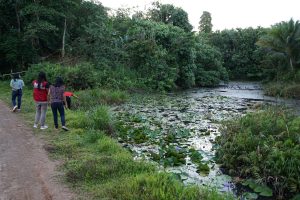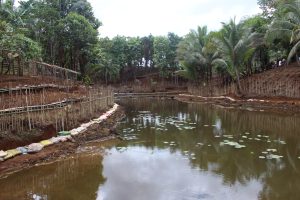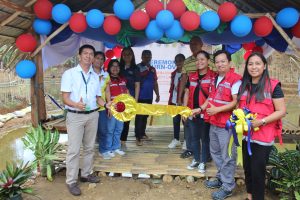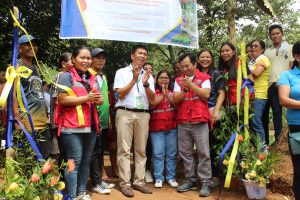A gentle upheaval is underway in the heart of the municipality of Lingig!


A pressing concern that affects the majority nowadays is how to mitigate the effects of climate change. More often than not, dealing with its effects is costly. In pursuit of addressing this issue, people usually seek solutions from distant horizons and view them as an insurmountable challenge, a colossal problem that no single individual can solve which can leave people powerless and overwhelmed.
The Local Adaptation to Water Access and Breaking Insufficiency through Nutritious Harvest for the Impoverished or the Project LAWA at BINHI, a recalibrated program under the Risk Resiliency Program of the Department of Social Welfare and Development (DSWD) will challenge people’s perception of the problems brought about by climate change.
Recognizing the untapped potential of the underutilized land in Barangay Mahayahay and Barangay Union in Lingig, Surigao del Sur, DSWD Field Office Caraga partnered with the local government unit of Lingig to carry out the Project LAWA at BINHI. Implemented in phases, each phase is designed to empower the partner beneficiaries which aims to transform timberlands into a sustainable source of food and water.
Stage 1: Learning and Development – Building Awareness and Advancing Climate Action
The first stage of Project LAWA at BINHI begins with learning and development sessions focusing on Climate Change and Mitigation – Disaster Risk Reduction (CCAM-DRR). Recognizing that education is the cornerstone of effective change, DSWD has tailored modules to equip partner beneficiaries with essential knowledge in addressing the effects of climate change.
423 partner beneficiaries, including farmers, persons with disabilities, and fisherfolks, gathered in Barangay Union to learn about the impact of climate change. Dr. Maria Isabel Lanada, Special Assistant to the Secretary (SAS), personally shared insights on the severity of extreme weather conditions, from rising temperatures to shifting weather patterns, emphasizing that human activities contribute to high temperatures and detailing how these actions lead to record temperature increases and that they can be mitigated by adopting responsible and environmentally conscious behaviors.
“Marami akong natutunan, i-share ko lang ang pinakaimportante – ang ating trabaho ay ating pahalagahan at ayusin. Hindi sweldo ang dapat nating hintayin kundi ang bunga ng ating tanim, dahil hindi lang ‘yan pang 20 days, pangmatagalan. Huwag na tayong pasaway, hindi na tayo dadagdag pa sa pagkasira ng mundo. Saludo kami sa inyo na nasa gobyerno (I have learned a lot and I want to share what is truly importan, and that is for us to value our work and do it with dedication. It’s not the salary we should be waiting for, but the harvest of the seeds we plant, because this will have a longer lasting impact, not just for 20 days. Let’s not be stubborn and add up to the cause fo the destruction of nature, rather, let’s work together to prevent further deterioration of our world),” Roel Binonggo, a resident of Barangay Union expressed.
“Inakay na tayo ng gobyerno, tayo pa ba ang aayaw. Salamat po sa suporta mayor, kapitan, at DSWD. Isa akong manunugal, lasinggera, at nagmamaldita, ngayon ayoko na. Natanto ko mula sa training na ‘to na hindi tama ang aking gingawa. Kayong taga Barangay Union, magtanim tayo ng gulay sa gano’n makaahon tayo sa kahirapan. Salamat, salamat po ng sobra (The government has provided us with guidance; should we refuse it? Thank you to our mayor, our barangay captain, and the DSWD for their assistance. I used to be a gambler, a drunkard, and a mean person, but I don’t want to live that way anymore. This training has opened my eyes to the wrongness of my actions, let’s all work together, Barangay Union, and plant vegetables so we can lift ourselves out of poverty. Thank you, thank you so much),” Clemencia Jimenez, from Barangay Mahayahay, shared her insight.
The 3-day training sessions covers Understanding Climate Change, Introduction to Risk Resiliency Program, Project LAWA at BINHI, Safety Protocols, and Guidance on the Implementation of RRP-CFTW.
Stage 2: 15-Day Active Work – Bringing Project LAWA at BINHI concept into Life
Armed with knowledge and understanding about climate change and the necessity to secure food and water, the partner-beneficiaries rolled up their sleeves and advanced to the second stage of implementation: 15 days of active work. During this phase, beneficiaries focused on rehabilitating available water resources and planting disaster-resilient food crops and fruit-bearing trees.
They begin by clearing water holes, which is overgrown with water lilies, bushes, and shrubs. At first glance, it seemed impossible to imagine the area as anything other than wild and untamed. But, Project LAWA at BINHI, saw it beyond that – it sees potential. After clearing the water holes, the construction of a sustainable fish pond then followed. It will soon be stocked with fingerlings supplied by the Municipal Agriculture’s Office of Lingig.
Adjacent to the ponds, the partner beneficiaries cultivated vegetable gardens by planting a variety of crops including chili peppers, tomatoes, leafy greens, and root crops.
After the beneficiaries worked under the heat of the sun for 15 days, removing overgrown weeds, carefully trimming trees, rehabilitating the water resources, and planting crops – the area is now clean and ready to serve the communities from the recipient barangays.
Stage 3: Project Sustainability – Ensuring Long-Term Food and Water Security
Seeing the purpose of the project and the impact it has with the community, the LGU of Lingig extended it full support to the program’s implementation. Lingig municipal mayor, Hon. Elmer Evangelio reminded his constituents of how blessed they are with the opportunity.
“I hope we avoid the ningas-kugon mentality, which means that we are only enthusiastic at the start of this project. You are the most important part of this project and will benefit most from its harvest. Whether we are paid or not, we will work because this project will sustain us. Let us now waste this opportunity. I am with you on this,” Mayor Evangelio said in his message during the turnover ceremony.
The final phase of the project implementation, which is centered on sustainability strategies, ensures that the benefits of Project LAWA at BINHI in the barangays will last for generations. This phase includes a two-day training designed to help the partner-beneficiaries identify solutions to potential challenges, maintain the project effectively, and address personal differences to prevent conflicts.
The training includes workshops where the partner beneficiaries are tasked with identifying gaps and potential challenges and devising solutions to address them. Additionally, the workshops focus on strategies to maintain the project, ensuring that it is not left unattended.
A Resource for Lingig
As Project LAWA at BINHI progresses, its ripple effect is already evident. DSWD Field Office Caraga proudly says that the results speak for themselves. What was once an overgrown and seemingly unusable space is now captivating with its cleanliness and its promise of abundance.
“Kining bayad [sweldo] nga among madawat gamay ra ni kumpara sa umaabot nga harvest. Ako, uban sa akong mga kaubanan, isaad nako, amua gayud ng palaguon. Salamat gayud sa DSWD ug sa DA nga naghatag tabang sa amua [pinaagi] sa cash ug may paabuton pa sa gayud na harvest (The compensation we are receiving now is just a small amount compared to the benefits we will have with the upcoming harvest. We promise to make the best of this opportunity. We are grateful to DSWD and DA for their support through cash and the harvest that we look forward to),” Villarin Pislan, Barangay Union partner-beneficiary shared.
No matter how beautiful a project concept is, it will only be in vain without the support and cooperation of its key stakeholders. However, the positive response from the provincial and local government units, down to the partner-beneficiaries, gives high hopes that Project LAWA at BINHI in Lingig, Surigao del Sur, will be successful.
At the end of the day, everyone needs to look past a myopic view of any situation and look at the broader, wider perspective of things because every opportunity offers favorable circumstances that will benefit those who are open to change.



